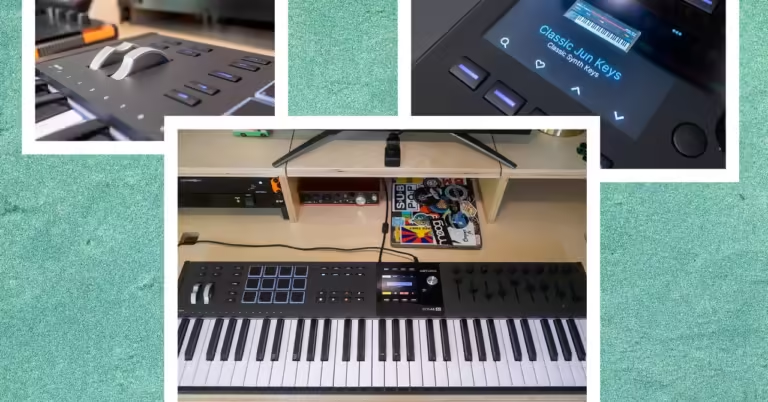You can also browse presets directly from KeyLab and filter by instrument, sound bank, or style, and while Native Instruments offers flashier and arguably more advanced versions of these same tools in its Kontrol series, I find Arturia’s UI more responsive.
Integration with Arturia’s individual instruments is a little patchy at the moment. Only a few instruments, such as the Mini V and Piano V, allow you to browse presets or display graphics, but I expect that will be fixed in an update soon. Because instrument interfaces vary widely, the way controls are mapped can also be inconsistent, and many of the standalone instruments have more parameters to contend with than there are actual controls to manipulate. You can easily remap these to your liking, but it does require an extra step.
KeyLab mk3 also offers control for Digital Audio Workstations (DAWs). Whether your DAW is Ableton Live, Bitwig Studio, FL Studio, Cubase, or Logic Pro, you can control it. Your choice of recording software will determine how tight the integration is. I only tested Ableton Live, and it worked mostly as expected. You can play and record using the transport controls, and the knobs and faders were automatically mapped to Ableton’s native instrument and effect controls. You can use the pads to trigger scenes and clips in Ableton’s Clip View, and there have been major improvements to make it easier to select and prepare tracks using the main encoder.
Other Goods
The new KeyLab mk3 has some other great features, including a scale mode to prevent you from playing out of key, and a great arpeggiator with randomization tools. It can act as a controller for your DAW or plugins, and also has 5-pin MIDI in/out ports for communicating directly with hardware synths. Plus, it comes with a solid software bundle that includes Analog Pro V, Mini V, Piano V, Augmented Strings, Ableton Live Lite, and more.
Ultimately, the reason to choose the KeyLab mk3 isn’t the arpeggiator (I think Native Instruments’ arpeggiator is better), but the high-quality hardware and seamless integration with Analog Lab. At $499 for the 49-key version and $599 for the 61-key version, it’s actually cheaper than comparative controllers from Novation and Native Instruments.
If you’re already a fan of Arturia’s software instruments and want something a little more premium than the plasticky KeyLab Essential series, the KeyLab mk3 is an obvious choice. But if you’re not yet committed to a particular suite of plug-ins, the KeyLab is a solid proposition, offering high-quality hardware at a lower price than the competition, packaged with some of the best classic synth emulations on the market.

